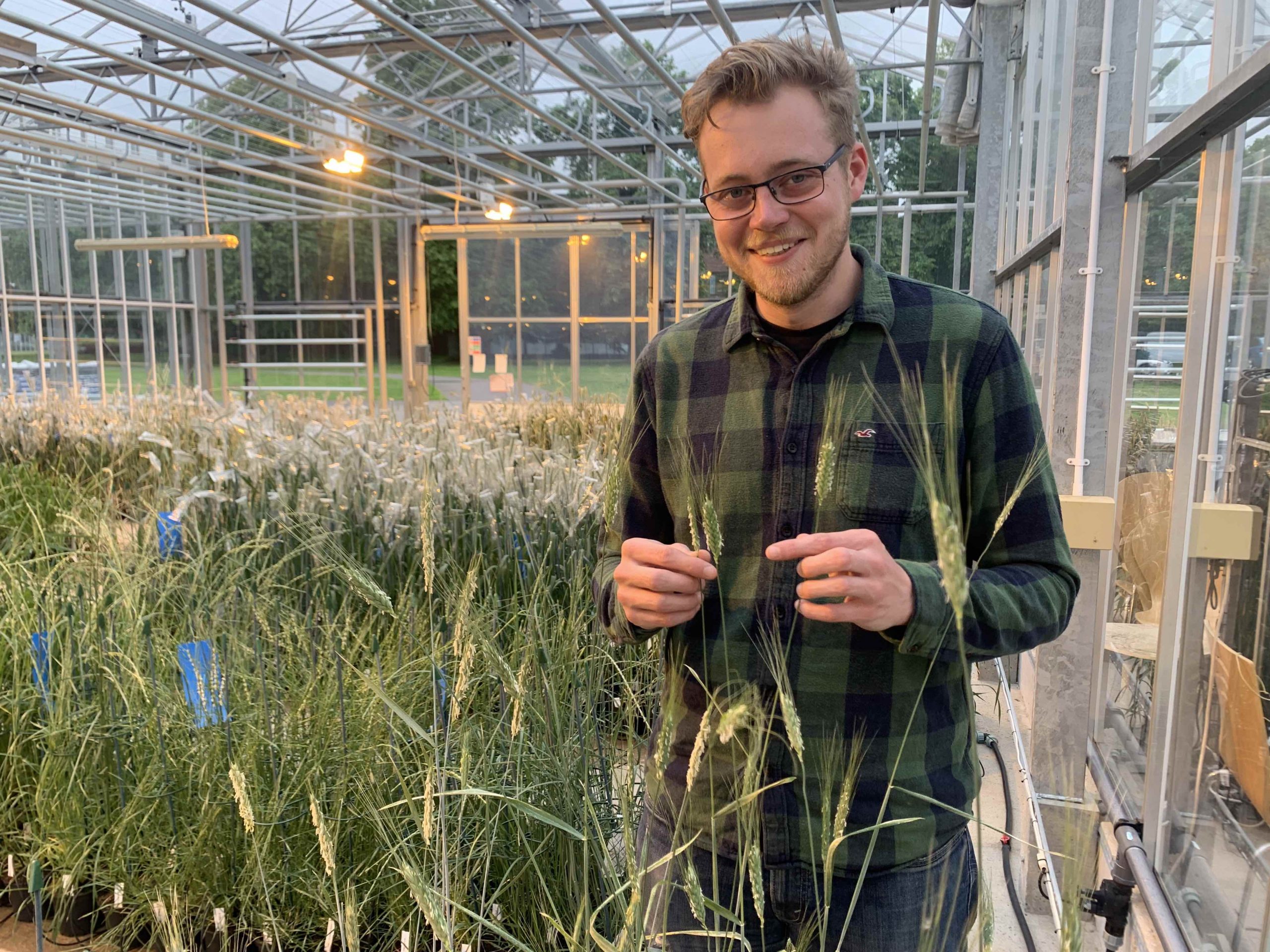
June 17, 2022, by Lexi Earl
Improving wheat with wild relatives: An interview with Jack Walker
Jack Walker is a PhD candidate with the UoN-Rothamsted Graduate Centre for International Agriculture. Their project explores the use of wild relatives to improve salt tolerance in wheat Their supervisors are Dr Surbhi Grewal, Professor Julie King and Dr Jonathon Atkinson. Prior to starting a PhD, Jack was a research technician at the University of Nottingham’s Wheat Research Centre.
Why did you decide to do a PhD? What were you doing before?
Before my PhD, I completed a BSc in Marine Biology at the University of Portsmouth. After graduation I travelled and volunteered, gaining wider life experience and having some fun. Upon my return I was heavily motivated to participate in scientific research and started a career as a research technician at the University of Nottingham. The project I was enrolled in was ‘genetic variation of flowering morphology for hybrid wheat’. This reignited my passion for education and research and it became clear that a PhD was the best option for me to pursue this passion further and develop a career.
Why did you choose this particular PhD project?
During my time as a research technician with the Nottingham BBSRC Wheat Research Centre I was introduced into the production of wheat-wild relative introgression lines. This opportunity allowed me to develop a deep understanding of comparing phenotype data with genetic data and how to determine and quantify both. Not only did the project widen my knowledge, but I found its potential application into increasing our food security hugely impactful. Therefore, when a PhD position arose that addresses two major concerns in modern agriculture: low genetic variation in elite cultivars and soil salinity, I knew it was the right PhD for me and had no hesitations in applying.
Tell us about your research. What do you study? Why is it important?
Wheat is grown under irrigated and rain-fed conditions, both types of agriculture are vulnerable to soil salinization. Wheat’s ability to tolerate salinity is restricted by limited genetic variation in existing elite cultivar genomes. Wild relatives of wheat (Triticum) are highly polymorphic and genetically diverse, and contain many halophytes. Therefore, wild relatives of Triticum species offer a promising source of variable germplasms which can increase salt tolerance in domesticated wheat. Increasing the salt tolerance of wheat would widen the available agricultural land for this crop, as we would be able to grow wheat in more types of soils, and help with global challenges of food security.

Jack in the lab
How do you explain your research to ordinary people?
Agricultural land is vulnerable to salt, especially on irrigated fields. Salt negatively affects plant growth and yield. Bread wheat is slightly salt tolerant but has wild relatives which are more highly salt tolerant that we can breed with bread wheat. However, the wild relatives have not been domesticated by humans and so are not suitable for agriculture and can significantly lower yields when introgressed into wheat. So, we aim to determine genes from wild relatives that are salt tolerant and introduce them into wheat, so that the salt tolerance of wheat is increased without a reduction in yield.
How is your first year going? Any highlights?
Fantastic, I have learned so much and have great plans for the future of the project. I have set up and completed an early experiment which showed some promising results, and I am currently designing a technique for screening wheat and wild relative genotypes for their salinity tolerance.
Has undertaking a PhD been different from other degrees you have done? How so?
A PhD is extremely different. My previous degree was a BSc (Hons) and so that consisted of lectures, coursework and exams with multiple students all doing very similar things. A PhD is much more independent and most of my time is spent either in the lab, glasshouse or at my desk researching and planning. The freedom and individuality of doctoral training is far more enjoyable to me, although it does come with more responsibility and stress, it is welcoming.
What have you learnt through your first PhD year?
Most importantly are the current advances that have been made in my field of work. In order to contribute to the cause, I must first understand what is currently known, so that the research I carry out is most relevant and useful for the future. I have also learned a few lab protocols for an experiment that I have carried out, and I am constantly learning how to be a better researcher.
How do you cope with the pressure of doing a PhD?
There is nothing I love to do more than decompress on a dog walk after a long day of work/studies. This is a daily routine that helps clear my mind. I am also a food enthusiast and love cooking new things. I often travel on weekends, visiting old friends or seeing new places and during the summer months I skateboard, surf and paddleboard.
No comments yet, fill out a comment to be the first

Leave a Reply